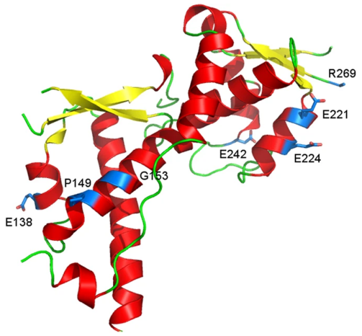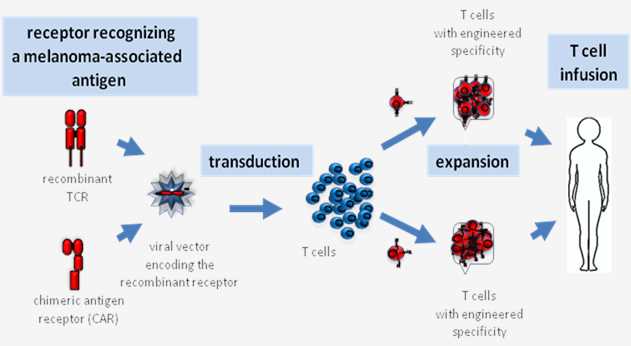NAA Services for Anti-MAGEA4
MAGEA4 antigen is a cancer-testis antigen (CTA) that is frequently expressed in tumor tissues and can activate the immune system to produce anti-MAGEA4 autoantibodies. The abundance of anti-MAGEA4 autoantibodies in gastric cancer indicates its potential as an effective biomarker for diseases diagnosis and therapeutic monitoring. With decades of experience and high-end technologies, Creative Biolabs has developed comprehensively diversified natural autoantibodies (NAA) platforms to offer fast and convenient NAA services for our worldwide customers. We will be your best companion in the NAA detection and analysis projects.
Background of MAGEA4
Melanoma-associated antigen 4 (MAGEA4) is an important member of the MAGE family of cancer-testis antigens (CTAs). CTAs are existing in most normal adult tissues, with limited expression in fetal, placental, testis, and ovary cells. Recently, the relevance of CTAs as prognostic biomarkers has been demonstrated in many malignant tumors, and they have been considered to be ideal targets for cancer immunotherapy. MAGEA4 also has been detected with high levels in ovarian serous carcinoma, various squamous carcinomas, testicular germ cell tumors, oesophageal mucosal melanoma, and triple-negative breast cancers, as well as gastric cancer. MAGEA4 may play a role in embryonal development and tumor transformation or aspects of tumor progression.
 Fig.1 Crystal structure of MAGE-A4 MHD. (Hagiwara, et al., 2016)
Fig.1 Crystal structure of MAGE-A4 MHD. (Hagiwara, et al., 2016)
The Role of Anti-MAGEA4 Antibody in Gastric Cancer
Gastric cancer is a lethal disease in which malignant cancer cells form in the lining of the stomach. Early gastric cancer detection is hampered by the lack of specific symptoms before it has spread beyond the original site. Patients with advanced stage gastric cancer have extremely poor survival rates. Therefore, screening and early detection of biomarkers for the early diagnosis of gastric cancer may significantly contribute to improving the therapy and prognosis.
In human gastric cancer, self-MAGEA4 expression shows high-relevance with tumor grade histology, tumor growth and differentiation, the rate of distant metastasis and 5-year survival. Moreover, MAGEA4 can be recognized by autologous cytolytic T lymphocytes and can elicit humoral and cellular immune responses, leading to large-scale production of anti-MAGEA4 autoantibodies. Because of this correlation, MAGEA4 autoantigen may be a valid indicator of gastric cancer, an effective target for some experimental engineered T-cell therapies and a possible target for cancer vaccine or immunotherapy. At present, MAGEA4 has been regarded as a highly significant prognostic marker for gastric cancer. Spontaneous humoral and cellular immune responses against MAGEA4 have been detected in gastric cancer patients.
 Fig.2 Adoptive cell therapy with redirected T cells. (Makalowski, 2013)
Fig.2 Adoptive cell therapy with redirected T cells. (Makalowski, 2013)
What Can We Do?
Aided by our well-established platforms and experienced scientists, Creative Biolabs can provide a whole set of services for the identification and detection of anti-MAGEA4 autoantibodies. Based on years of extensive experience in NAA research, we can offer different and suitable methods for your choice, including but not limited to autoantigen/autoantibody array, peptide array, Enzyme-Linked Immunosorbent Assay (ELISA), LIPS, WB and dot blot. Besides, other NAA services (NAA detection, NAA profiling, NAA epitope mapping, etc.) and off-the-peg NAA products are also available for your benefit.
Features of Our Services
- Advanced platform and experienced scientists
- High accuracy without numerous repeated trials
- One-stop pipeline to save your time
- Cost-effective and best after-sale service
Identification and detection of anti-MAGEA4 autoantibodies are of great clinical importance to diagnose the disease before the cancer onset, and to improve the curative rate and survival rate. Creative Biolabs is well-positioned to provide the largest portfolio of products and services about NAA. We also provide custom services to meet the clients' specific demands. Please contact us for more information.
References:
- Hagiwara, Y.; et al. Consequences of point mutations in melanoma-associated antigen 4 (MAGE-A4) protein: Insights from structural and biophysical studies. Scientific reports. 2016, 6(1): 1-12.
- Makalowski, J.; Abken, H. Adoptive Cell Therapy of Melanoma: The Challenges of Targeting the Beating Heart. In Melanoma-From Early Detection to Treatment. 2013.
Related Services:
- NAA Services for Anti-TERF1 Antibody
- NAA Services for Anti-HCC-22-5
- NAA Services for Anti-Peroxiredoxin VI
- NAA Services for Anti-KM-HN-1
- NAA Services for Anti-p90
- NAA Services for Anti-NT5E Antibody
- NAA Services for Anti-COPS2 Antibody
- NAA Services for Anti-CTSF Antibody

